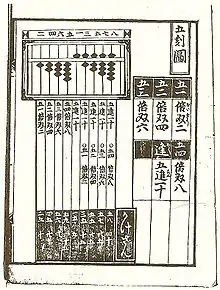Jinkōki
Jinkōki (塵劫記, じんこうき, Chinese: 尘劫记; pinyin: Chénjiéjì, Permanent Mathematics) is a three-volume work on Japanese mathematics, first edited and published by Yoshida Mitsuyoshi in 1627. Over his lifetime, Mitsuyoshi revised Jinkōki several times.[1] The edition released in the eleventh year of the Kan'ei era (1641) became particularly widespread. The last version personally published by Mitsuyoshi was the Idai (井大), which came out in the eighteenth year of the Kan'ei (1634). Subsequent to that, various editions of Jinkōki were released, one of which includes Shinpen Jinkōki (新編塵劫記).[2]
 Section from the Jinkōki | |
| Editor | Yoshida Mitsuyoshi |
|---|---|
| Original title | 塵劫記 |
| Country | Japan |
| Language | Japanese |
Publication date | 1627 |
The Jinkouki is partly based on the works of Yuan dynasty mathematicians in China.[3]
The Jinkouki is also one of the most popular and influential Japanese mathematics books in history,[4] having influenced many later Japanese mathematicians such as Seki Takakazu and Kaibara Ekken.[3]
Etymology
In Chinese, the characters 塵劫記 (Chinese: 尘劫记; pinyin: Chénjiéjì) literally mean "dust tribulation record", where 劫 can mean a calamity or kalpa (a unit of time in Buddhism). In Buddhism, one aeon or kalpa (劫) is related to the age of the universe. Then in Chinese, the phrase 塵劫 / 尘劫 means an infinite, boundless kalpa. Thus in the Jinkouki, the 塵劫 is translated as "permanence". Later on 尘劫 has also been taken to refer to the calamities and tribulations of the mortal world (尘世).[3]
The name 尘劫记 is derived from the 尘点劫 of the Buddhist Lotus Sutra (法华经 in the Chinese translation).[3]
Contents
The book contained instructions for dividing and multiplying with a soroban and mathematical problems relevant to merchants and craftsmen. The book also contained several interesting mathematical problems, and was the first Japanese book to use printing in colour. As a result, the Jinkōki became the most popular Japanese mathematics book ever and one of the most widely read books of the Edo period. Mitsuyoshi made reference to everyday problems, such as buying and selling rice.[4]
The book was originally published in three volumes, the first of which mainly describes multiplication and division using the soroban. The second and third volumes include an assortment of practical and recreational problems. The included problems are not arranged according to any specific order.[5]
The book includes ideas that aimed to keep readers from boredom by adopting a wide variety of problems such as calculations of areas of rice fields, problems related to the construction of rivers and riverbanks, geometric progression, and the Josephus problem. The Shinpen Jinkōki was the most widespread version among the copies of Jinkōki, and widely used as a textbook for use of the soroban throughout the Edo period.[6]
In addition to fundamental knowledge such as numerical notation, units, and multiplication tables, it also included slightly more specialised topics, such as methods to find square roots and cube roots, practical calculations of area, currency conversion, and interest calculation. The content covers almost all arithmetic needed in daily life at that time, and it is a characteristic of the book that explanations are given using familiar topics, such as using the increase of mice as an example for geometric progression.[4]
Many different versions were published, with slightly modified content, and by the time of the Meiji era, over 400 editions of Jinkōki had been published.[7][1]
Gallery
 Copy of Jinkōki found in National Museum of Nature and Science
Copy of Jinkōki found in National Museum of Nature and Science Monument inscribed with the words Jinkōki
Monument inscribed with the words Jinkōki
See also
References
- Mitsuyoshi, Y.; Sato, K. (2006). 吉田光由『「塵劫記」初版本 影印、現代文字、そして現代語訳』 [First Edition of 'Jinkōki': Facsimile, Modern Characters, and Modern Translation] (in Japanese). Kenkyūsha. ISBN 978-4-87639-409-8.
- "Jinkoki: Japanese Mathematics in the Edo Period". www.ndl.go.jp. Retrieved 8 July 2023.
- 鳴海風「和算」『東京人』第321号、都市出版、52-56頁、2013年2月3日。
- Nishida, T. (2005). 『塵劫記』にまなぶ [Learning from 'Jinkōki'] (in Japanese). Kenkyusha. ISBN 978-4-87639-138-7. Retrieved 13 July 2023.
{{cite book}}: CS1 maint: date and year (link) - Yoshida, M.; Ōya, S.; Shoten, I. (1997). 吉田光由の『塵劫記』: 二十六条本の現代訳と変遷 [Jinkōki, annotated by Shinichi Ōya, Iwanami Shoten] (in Japanese). ISBN 978-4-87639-608-5. Retrieved 13 July 2023.
{{cite book}}: CS1 maint: date and year (link) - Sato, K. (2013), Knobloch, E.; Komatsu, H.; Liu, D. (eds.), "The Jinkōki of Yoshida Mitsuyoshi", Seki, Founder of Modern Mathematics in Japan, Springer Proceedings in Mathematics & Statistics, Tokyo: Springer Japan, vol. 39, pp. 173–186, doi:10.1007/978-4-431-54273-5_12, ISBN 978-4-431-54272-8, retrieved 13 July 2023
- "東北大学デジタルコレクション詳細画面" [Jinkōki]. www.i-repository.net. Tokoku University. Retrieved 13 July 2023.